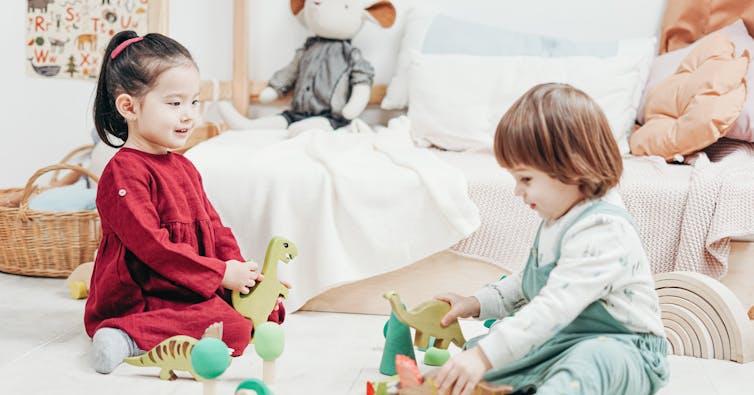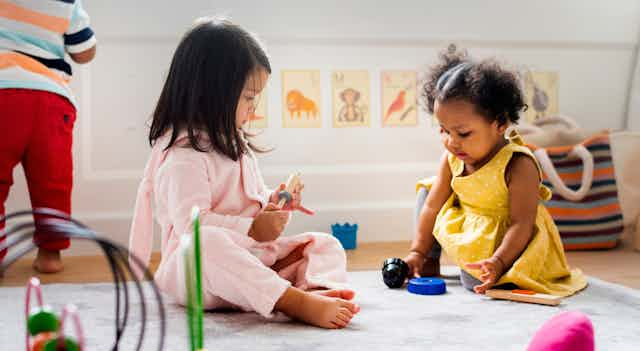A mother wondered about her two-year-old child Oliver’s socialization with peers when he played at his friend’s house or when he was at his child-care centre. Since Oliver is still learning to talk, he cannot describe his social experiences.
This is a fictional situation, but researchers encounter similar challenges when gathering information about very young children’s experiences with peers. Yet, it is important to study young children’s socialization with peers, as these early, initial interactions set the stage for the quality of later relationships.
In collaboration with colleagues Ayelet Lahat, Holly Recchia, William Bukowski and Jonathan Santo, we used a unique dataset to study how these young children’s relationships form. We included 32 toddlers of two different age cohorts, with children either aged about 20 months or about 30 months.
Each toddler was paired with two same-age, same-gender toddlers. Each pair met for 18 different 45-minute play dates over a four-month period, so each child had a total of 36 play dates. We observed how very young children (20-month-olds) developed peer relationships, and how they are capable of engaging in complex games as they get to know a peer over time.

Interaction between two regular playmates
Our study recruited parents in a mid-sized Canadian city (in Waterloo Region, Ont.) by phone, based on birth announcements in a local newspaper. Most parents in the sample had at least some post-secondary education.
Collecting data was not easy, since parents had to agree to 36 play dates with one of two regular playmates in the study. Having a series of play dates allowed us to explore the changes in children’s interactions as they formed a relationship with a peer.
Play dates alternated between the toddlers’ homes, and between visits with the two different play partners. All participating parents were mothers. Mothers were asked to allow the children to interact freely with one another and not to direct or organize their play; they were free to respond to the toddlers’ overtures.
A researcher followed the children and dictated all peer-related social actions onto one track of an audio tape recorder. On a second track, the children’s verbal and vocal behaviour was recorded.
How consistent are children with different peers?
All children’s interactions were coded into:
- the type of actions: for example, does the child smile, watch or show another child something?
- type of sequences: for example, a conflict, a game or a series of actions made by children in response to an action made by the peer, such as a child offering to share a snack and the other child accepting.
- type of contributions: if a child initiates or ends a sequence.

The dataset is complex to analyze because each child had two play partners, and because the play took place over time.
However, the dataset is unique and valuable because it provides the opportunity to study how young children develop peer relationships and how consistent they are in how they interact with different children.
Role of age and language ability
A first study examined the change in interactions over time. We found that as toddlers form peer relationships, positive interactions such as games, social pretend play and relationship-affirming gestures (like greeting or thanking each other, or laughing in delight) further increased, and conflicts or negative actions (such as inflicting bodily harm or disruptive fussing) decreased.
Toddlers’ interactions become increasingly more organized and positive as the relationship evolved. Age and language ability predicted changes in frequency and length of the different types of sequences.
Importance of initial behaviours
A second study on positive and negative actions found that toddlers’ behaviours, when they initially meet, set the stage for the relationships they develop. So, it is important for toddlers to have more positive interactions at the beginning of the relationship.
A third study on social pretend play, which is currently in press, indicated that young children are capable of engaging in social pretend play — a form of complex interaction — with peers.
Successful initiations of pretend play increased faster as children got to know one another, towards later play dates. Children’s age and language abilities were positively associated with the frequency and the length of social pretend play.

Consistent play partners matter
Changes in children’s interactions as they get to know one another are complex. Overall, positive interactions tend to increase and early positive interactions predict later positive interactions.
Caregivers and parents should be aware that toddlers develop relationships with peers. Having a consistent play partner is important, as children’s interactions become more involved and sophisticated once they get to know one another.
It is important for young children to have a positive play partner, as a positive peer can promote positive peer interactions and relationships.

Socially sophisticated play
These findings suggest several considerations and practices for parents and caregivers and for child policy.
It is important for caregivers and parents to intervene and support children when they experience negative interactions with peers as children get to know one another (during the first few times when two unfamiliar toddlers meet) and to encourage positive interactions between them. If a child doesn’t know how to initiate interactions with a peer, adults may model or encourage the child to invite the peer to play games by sharing toys.
Our study documents that even 20-month-old children are able to engage in socially sophisticated play. Parents and all caregivers and educators should provide materials to enable very young children’s play.
The opportunity to develop relationships with specific peers can be fostered by regularly attending early childhood education programs or regularly playing with the same children.

